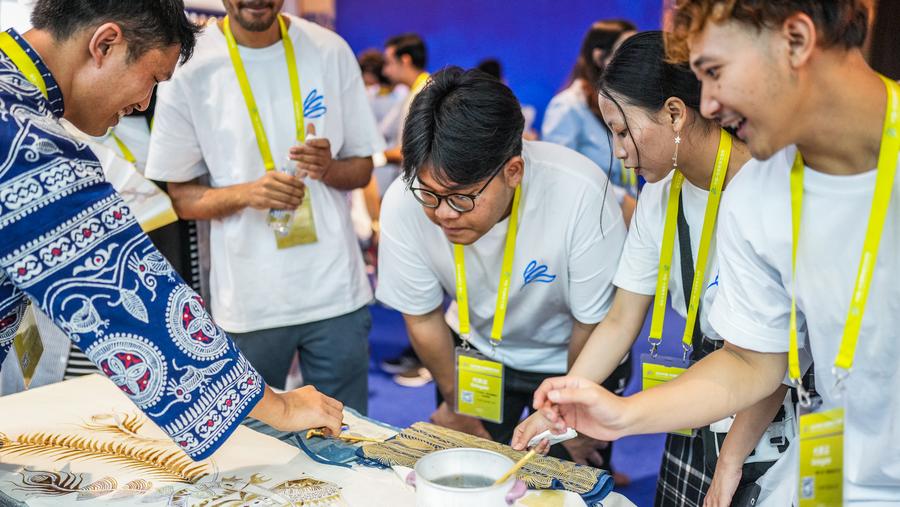China, ASEAN boost vocational education for regional development

Foreign students visit a batik craft exhibition during the 2024 China-ASEAN Education Cooperation Week in southwest China's Guizhou Province, Aug. 21, 2024. (Xinhua/Tao Liang)
NANNING, Dec. 23 (Xinhua) -- At Liuzhou Polytechnic University in south China's Guangxi Zhuang Autonomous Region, Muhammad Luthfi Adri from Jakarta State Polytechnic in Indonesia is taking notes of the knowledge about excavator after-sales services at class, expecting the skills training course to boost his career in the engineering machinery industry.
"I've learned advanced theoretical knowledge and practical skills from this program," said the 21-year-old student.
He is one of the 20 students who traveled from Indonesia to China for a specialized training program jointly organized by Guangxi LiuGong Machinery Co., Ltd. and Liuzhou Polytechnic University, among other partners.
The program combines classroom instruction in engineering machinery with internships at LiuGong, providing students with both technical expertise and industry exposure.
The initiative reflects the expanding collaboration between China and the Association of Southeast Asian Nations (ASEAN) in vocational education, a key focus of regional cooperation. Programs such as degree courses, employer-assisted training, and short-term exchanges have helped upskill workers to meet the needs of industries across ASEAN.
Guangxi, a hub for China-ASEAN partnerships, has been instrumental in these efforts. Local universities have established 17 vocational institutes tailored to ASEAN markets, supporting sectors like agriculture, transportation and energy. These institutes are designed to meet industry demand, offering training that aligns with the needs of businesses operating across borders.
For companies like LiuGong, which sells products in over 180 countries and regions, these partnerships help address the challenge of finding skilled workers for global operations.
"Joining the training program gives students a chance to work with a leading company and grow into key players in the field," said Luo Guobing, senior vice president of LiuGong.
Many graduates now work at LiuGong's subsidiaries in ASEAN countries, where they contribute their skills and gain international experience, Luo added.
Such programs are also transforming the careers of young people. Intira Punwilai, a Thai graduate of a mechatronics program in Liuzhou, now works at a high-tech Chinese company in Thailand. Her technical skills and fluency in Chinese have made her a valuable team member and mentor for new trainees.
Guangxi has also developed multilingual training materials to support vocational education in ASEAN countries like Thailand, Myanmar and Indonesia. These resources, available in languages such as Thai and Indonesian, provide targeted support for workforce development.
"Industries like textiles, e-commerce, and tourism are growing rapidly in ASEAN, creating a strong demand for vocational training," said Huang Rongmei, director of the International Exchange Affairs Office at Guangxi Economic and Trade Vocational Institute.
"Closer cooperation in these areas is conducive to the industrial growth in ASEAN and the sound development of the regional economy," Huang added.


